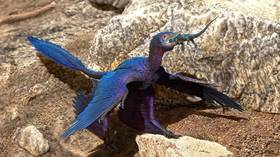Doomed dinosaur’s last meal reveals previously unknown lizard species (IMAGE)

The incredibly well-preserved stomach contents of a dinosaur who died soon after gobbling its last meal have revealed a previously unknown species of lizard that dates back 120 million years.
The lizard, now named Indrasaurus wangi, is unlike any known species from the Cretaceous Period – an era that followed the Jurassic Period and ended 66 million years ago.
The unlucky creature was discovered inside the stomach of a microraptor, a small, feathered, four-winged dinosaur, in what is now northeastern China. A study of the dinosaur showed it scoffed the lizard whole, and head-first, preserving it in its stomach before dying a short time later.
Also on rt.com Greatest race ever? 'World's fastest T-Rex' contest takes place at racetrack in Washington (VIDEO)This is now the fourth known instance of a microraptor’s stomach contents being well preserved for future study. However, this is the first confirmed piece of evidence that the dinosaur ate lizards, giving new insight into the food chain from 140 million years ago.
The fossil was unearthed around 2003 and spent years in China’s Tianyu Museum of Nature before a team of paleontologists noticed the incredibly well-preserved bones of the lizard.
Also on rt.com Fearsome ‘warg-like' ancient predator was bigger than a polar bear (PHOTOS)The team, from the Institute of Vertebrate Paleontology and Paleoanthropology (IVPP) of the Chinese Academy of Sciences, published their findings in the journal Current Biology. The researchers say this is the most detailed insight yet into what and how animals ate in this era, as well as how dinosaurs evolved to digest their food.
Think your friends would be interested? Share this story!















